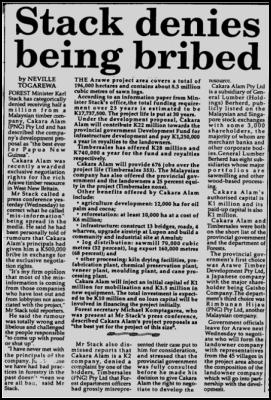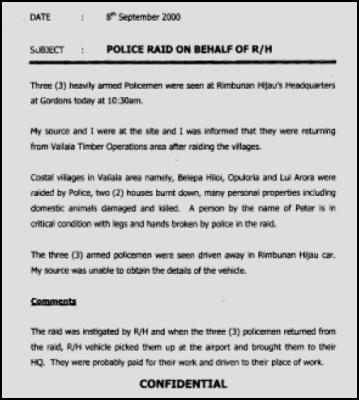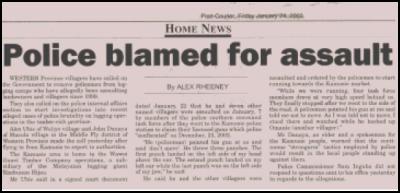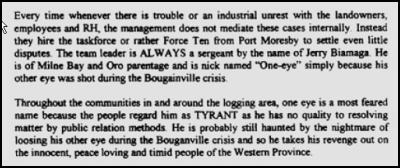Masalai i tokaut: Sold Into Slavery
Sold Into Slavery
www.masalai-i-tokaut.com
Forest Minister Patrick Pruaitch is preparing to sell the people of Asengseng and Rottock Bay in West New Britain into a life of slavery, prostitution and general misery.
In the next few weeks the Minister will grant new logging permits to Rimbunan Hijau and Cakara Alam allowing them to harvest the last fragments of forest in what is already PNG’s most heavily logged Province.
This is despite numerous reports detailing the appalling performance of these companies in almost every aspect of their current logging operations and the admission from the Department of Labour that Rimbunan Hijau employs hundreds of illegal foreign workers and treats its local staff like slaves.
Against these facts, the Ministers claims that the projects will bring much needed ‘development’ for local communities is laughable – he is talking about same imaginary roads, bridges, jobs, agriculture projects, sawmills and other processing industries that the loggers have failed to provide in the other 23 forestry projects that have been logged out in West New Britain in the last 25 years? When he issues the timber permits the Minister will be acting in defiance of the law, the Ombudsman Commission, logic and all common sense in a cynical ploy to line his own pockets and those of the National Alliance Party…..and, of course, boost the bank balances of his Malaysian logging friends .
Bizarrely the Minister will also be breeching his own new Downstream Processing Policy that demands no further log exports from the island of New Britain.
Patrick Pruaitch will also be ignoring the declared wishes of many of the landowners from the project areas as he once again demonstrates his blind allegiance to the interests of the Malaysian logging industry.
The Minister for Forests Patrick Pruaitch is preparing to issue Timber Permits for two new large-scale logging operations in West New Britain. This follows the decision of the National Forest Board – under strong political pressure – to approve the projects.
The Timber Permit for Asengseng will be issued to Rimbunan Hijau (in the guise of its wholly owned subsidiary Niugini Lumber) while the Rottock Bay Timber Permit will be given to another Malaysian logging company, Cakara Alam.
The awarding of these timber permits will be totally unlawful.
Workers treated like slaves
A Department of Labour report recently revealed how Rimbunan Hijau treats its local workers like slaves.
Papua New Guinean workers are forced to endure low wages, "cheating and dishonest'’ by the company, cramped and unhygienic living conditions, racial and sexual abuse and there is a complete disregard for their health and safety.
"The company’s treatment of its citizen employees reflects labour exploitation and slavery and should be condemned at all levels", says the Department of Labour.
Wages paid by Rimbunan Hijau are criminally low – just 63 toea an hour (that’s about 15 US cents). And wages have not increased for more than ten years.
In addition most of what is paid is then stolen back by the company as they force their workers to buy all their food and other supplies in company canteens. Here the prices are not displayed and the workers only find out how much they have been charged when they receive their wages with the money already deducted.
According to the Department of Labour, the prices charged are "exorbitantly high" and "this is absolutely cheating and dishonesty by the company".
The workers are also forced to endure very cramped and unhygienic accommodation. Two families are forced to share a four metre square room with only a curtain to separate them and a single switch for the one light and one fan. For single workers, they are forced to live seven to a room.
Conditions are "appalling, with overcrowding and are totally unsafe".
Illegal foreign workers
The Department of Labour report also confirms that Rimbunan Hijau uses large numbers of illegal foreign workers in its logging operations, has no interest in the training and development of local workers and implements no health and safety practices to protect its workers.
In just one logging operation Rimbunan Hijau employs at least one hundred and ten foreign workers while there is just one Papua New Guinean in a management role.
Of these 110 non citizens, only thirty one were legally employed by the logging company.
ONLY 31 out of 112. That is just 28%. EIGHTY ONE foreign workers in just one logging camp are there ILLEGALLY.
It is little wonder that the Department of Labour concludes, "the company has total disrespect for the Employment of Non Citizens Act" and the report identifies the "management’s ignorance and disrespect for the law".
The Labour Department report is also very critical of Rimbunan Hijau’s attitude towards staff training. "Training, training implementation and localization is non existent" says the report.
These are just a few quotes from the report on health and safety issues:
• "The level of safety practices and implementation is appalling and cannot be measured against any standard",
• "Safe working practices is non existent"
• There is "absolutely no regard for safety and safe working practices"
• Working conditions are "very hazardous and appalling".
The report concludes "the behaviour by the company is totally unacceptable and must be penalized".
Present logging performance – Cakara Alam
Cakara Alam is currently logging the last few remaining trees in its East Arowe timber operation.
This Timber Permit was one of many rushed through the allocation process in 1991 in the last days before the passing of the new Forestry Act and thereby avoided many of the reforms implemented as a result of the scandals uncovered by Thomas Barnett in his Commission of Inquiry.
Under the terms of its Timber Permit Cakara Alam was to establish a sawmill within two years and thereafter process a minimum of 30,000 cubic metres of round logs every year. The company has totally ignored this requirement, cheating the landowners of jobs, the Government of important revenues and the general economy of a significant investment.
The company was also to develop a land utilization plan including funded agricultural developments, reforestation activities and measures to ‘achieve the objective of sustainable yield management of the resource’.
Cakara Alam has totally failed to develop and implement a land utilization plan and therefore it has denied local landowners all their legitimate development aspirations from the logging project.
Since 1999 the company has failed to pay over K300,000 in agriculture and development levies and over the life of the project has failed totally in its promise to ‘assist local people in the development of smallholder projects, agriculture development’ and ‘development projects.
According to the National Forest Service the Permit Holder has misused all the development funds, nothing has been paid since 1999 and the number of projects implemented ‘is nil’.
The company has also failed to achieve any measure of sustainable yield management – hence the forest is almost logged out and Cakara Alam is desperate to get the new Permit for Rottock Bay so it can destroy a further area of forest.
Typically the company has also failed to install any permanent bridges or culverts or to gravel any of the roads promised in the Timber Permit. It did construct an airstrip – but this is unused because the people cannot afford to pay airfares and therefore there is no demand for air services.
It is interesting to note that at the time that the timber permit for the Arowe project was given out the then Forest Minister Carl Stack was publicly forced to deny allegations that he had been paid K500,000 by Cakara Alam.

Click for big version
In response to these claims the Minister lauded the project as ‘the best ever for PNG’ and listed the benefits the people would receive including 12,000 hectares of agricultural development, at least 10,000 hectares of reforestation, a sawmill, 13 bridges, other processing including a kiln drying plant, veneer plant, moulding plant and cane processing (The Times, 29 March 1989, page 2).
The list of monetary benefits, infrastructure developments and other promises for the Rottock Bay project are remarkably similar to those previously promised for Arowe by the SAME logging company.
We suggest that our present Forest Minister should revisit history and learn from the mistakes of his predecessor – rather than following his example by taking the logging companies money and casting false promises…..
Other abuses by Rimbunan Hijau
The list of un-investigated crimes and abuses committed by Rimbunan Hijau companies right around PNG are far too numerous to be covered here. Instead we over you a mere flavour of the extent of this companies involvement in illegal and inhumane activities Rimbunan Hijau relies extensively on police brutality to protect its operations from angry landowners and local workers:
▫ National Intelligence Organisation Report

▫ Post Courier, January 2003

Click for big version
▫ Monopolist and tyrant Malaysian company

In 1999 the Assistant District Commissioner and Officer in Charge of a Government Station investigated allegations of abuse by police officers acting on behalf of Rimbunan Hijau and submitted his own report He had no doubt that police officers were terrorizing local people and company workers.

The officer concluded his report by describing Rimbunan Hijau as a “Monopolist and Tyrant Asian company” and he compared their treatment of local people to a military dictatorship where freedom of expression and speech is abused and denied. He called on the “highest command of the Police Force to look seriously into this matter as soon as possible”
▫ Department of Community Development
In 2004 the Department of Community Development visited Rimbunan Hijau logging camps to investigate the social conditions.
Lady Carol Kidu’s department confirms that in Wawoi Guavi “Landowners and employees stated that Task Force Police were there to protect the Company (Rimbunan Hijau) and their supporters and not citizens of PNG” and that it was alleged that the police were bribed by RH.
The report also exposed inhumane living and working conditions and other abuses.
Ignoring landowner wishes
In both Asengseng and Rottock Bay large numbers of landowners have expressed their opposition to the intended logging companies.
In a letter dated 14 October 2004, signed by the representatives of 17 groups, landowners pointed out to the National Forest Board that they did NOT want Cakara Alam to be given the Rottock Bay permit.
For the landowners it is clear that the “finalisation of negotiations with Cakara Alam is very highly questionable because of the track record of its operations in Arowe TRP, which clearly indicate its failure in meeting its contractual obligations”.
The landowners also questioned Cakara Alam’s “continual entertainment of NFS officers and PFMC members thus leading to a very biased handling of the process” and accused the Forest Authority of a failure to protect the landowner’s rights.
The landowner’s dissatisfaction with Rimbunan Hijau and Cakara Alam and the handling of their timber projects is evidenced by the fact that the National Forest Service negotiating team has had to hold its meetings with the logging companies in East New Britain – because they feared landowner disruptions! This can never be the basis for a fair and equitable logging project.
Meanwhile 21 clan groups from Asengseng have told the National Forest Authority that they do not want their logging project to go ahead.
In two separate letters dated January 18th 2005 the 21 groups informed the National Forest Board that they wanted ‘to withdraw from the FMA concept’ and pointed to the ‘miserable’ failure of other similar large-scale timber projects to achieve their objectives.
But their pleas have been ignored. The Forest Board didn’t even bother to assess the size of the land controlled by the 21 groups or what impact their removal would have on the sustainability of the whole project.
Defiance of the Ombudsman Commission
The issue of the two new Timber Permits for Asengseng and Rottock Bay will also be in direct defiance of the instructions of the Ombudsman Commission.
In July 2002 the Ombudsman Commission published its report on attempts by Rimbunan Hijau to unlawfully gain access to the Kamula Doso logging project by extending the boundaries of its Wawoi Guavi timber permit.
The Ombudsman specifically ordered that the Minister for Forests and the National Forest Board should “reject future applications from those (logging companies) who have failed to meet their statutory, contractual or fiduciary obligations (in their current logging operations)”.
The Ombudsman noted that “non-compliance with the due process of the law is widespread in the forest industry.
All the available evidence shows that Niugini Lumber, Rimbunan Hijau and Cakara Alam have clearly and repeatedly failed in their statutory, contractual and fiduciary duties in all their existing logging operations.
The Ombudsman also ordered that “all future project proposals by the Rimbunan Hijau group of companies be critically screened before approval".
This has also been assiduously ignored by the Forest Minister and the National Forest Board.
Breach by the Minister and the National Forest Board of the Ombudsman’s orders places them in breach of the Leadership Code.
Downstream processing policy
The Minister for Forests will shortly be presenting to the National Executive Council a new Downstream Processing Policy for the forestry sector.
The purpose of the Policy is to ‘promote industrial development in the forestry sector’ as a means to facilitate ‘the transfer of technology, creation of employment, broadening of incometax base and the export of value added products and increase foreign exchange earnings’.
The Policy identifies some Provinces as having only ‘limited natural forest resources’. These are New Ireland, East New Britain, WEST NEW BRITAIN, Central, Morobe, Milne Bay, Manus, Eastern Highlands, Chimbu, Enga and Western Highlands.
The Policy states that ‘any new concessions in these Provinces will SOLELY BE FOR PROCESSING PURPOSES’.
Why is it the case that the Timber Permit for Asengseng will allow raw log exports of 96,000 cubic metres in years 1-5 and 76,000 cubic metres thereafter? That’s a total over the life of the project of 2,760,000 cubic metres of raw logs. In contrast the logging company will have to process only 600,000 cubic metres of logs.
This means of the total log harvest less than 18% will be processed.
For Rottock Bay the figures are raw log exports of 2,161,000 cubic meters while 590,000 cubic metres are processed. This means a measly 22% of the total log volume will be processed.
So the Minister will be going totally against his own Forest Policy that is meant to benefit Papua New Guinea, and will instead allow the Malaysian loggers to export our precious resources at the lowest possible prices and keep all the processing profits off shore.
Come on Minister, who are you working for?
Find us on the web: www.masalai-i-tokaut.com


 Binoy Kampmark: Rogue States And Thought Crimes - Israel Strikes Iran
Binoy Kampmark: Rogue States And Thought Crimes - Israel Strikes Iran Eugene Doyle: The West’s War On Iran
Eugene Doyle: The West’s War On Iran Richard S. Ehrlich: Deadly Border Feud Between Thailand & Cambodia
Richard S. Ehrlich: Deadly Border Feud Between Thailand & Cambodia Gordon Campbell: On Free Speech And Anti-Semitism
Gordon Campbell: On Free Speech And Anti-Semitism Ian Powell: The Disgrace Of The Hospice Care Funding Scandal
Ian Powell: The Disgrace Of The Hospice Care Funding Scandal Binoy Kampmark: Catching Israel Out - Gaza And The Madleen “Selfie” Protest
Binoy Kampmark: Catching Israel Out - Gaza And The Madleen “Selfie” Protest